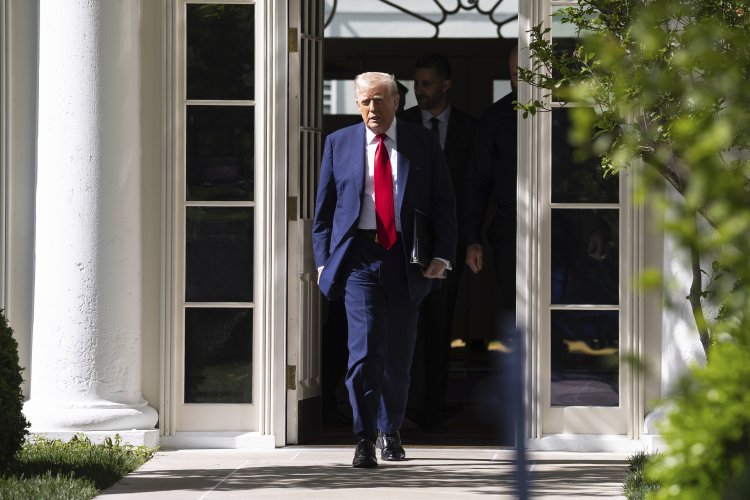Democrats Regard Trump as Economically Vulnerable — Provided They Can Offer an Alternative
After conducting its most recent series of focus groups, Navigator Research is advising Democrats to take a proactive approach in promoting their own economic policies.

A series of focus groups involving 2024 Trump voters, conducted by the Democratic group Navigator Research and shared exclusively with PMG, corroborates recent public polling indicating widespread frustration with Trump's handling of tariffs and the cost of living. Congressional Democrats are looking to leverage this sentiment as they prepare for the upcoming midterm elections.
However, they may not have enough momentum yet.
Navigator Research's latest findings suggest that Democrats need to actively promote their economic policies rather than assume that disgruntled voters will naturally return to them. Rachael Russell, director of polling and analytics at Navigator Research, emphasized that Democrats should offer a vision of an inclusive economy, stating, “it can't just be that the economy sucks.”
“Now is the time to provide real solutions that people can look to as an alternative because we're seeing that splintering right now, we're seeing people say, ‘this isn't necessarily what I voted for,’” Russell noted.
The challenge for Democrats, she observed, is the lack of alternative proposals from many within the party. “Everyone's kind of like, we're not in power, we can't do anything,” she explained.
Russell believes that presenting a proactive vision could inspire the electorate more effectively: “There's people out there doing this on their own, but as an entity, as a party, it doesn't feel like there's a real vision that's being expressed.”
Recent public opinion has shown a downturn in support for Trump. A CNN poll revealed that a majority of Americans believe his policies have worsened economic conditions, marking an 8 percentage point increase since the previous month. Participants in Navigator’s focus groups described Trump's first 100 days of his second term as “chaotic,” “disappointing,” and a “mixed bag.”
One participant, a Black woman from Pennsylvania, expressed frustration, saying she “specifically voted for him because of the economy,” but now feels disillusioned about his performance. “I just feel like now it's just downhill from there,” she added.
Another voter, a white woman also from Pennsylvania, lamented, “I definitely feel like he's not keeping his promises and I regret voting for him.”
The focus groups coincided with Trump’s first 100 days in office, during which his approval ratings have plummeted to the lowest levels of any president in decades. According to a New York Times/Siena College poll, voters disapprove of Trump’s management of various issues, including immigration and the economy—traditionally viewed as his strong suits.
In response to unfavorable polling from sources like The New York Times and ABC, Trump took to Truth Social, labeling the findings as “FAKE POLLS FROM FAKE NEWS ORGANIZATIONS.”
The sentiments expressed in public opinion polls were echoed in Navigator’s discussions with 2024 Trump voters from critical swing states such as North Carolina, Pennsylvania, and Michigan. These voters voiced concerns that the cost of living has not improved since Trump assumed office, contradicting a key campaign promise.
Regarding tariffs, although several Trump voters appreciated the concept, they criticized the “out-of-control” implementation. “It's not a bad idea, but if the implementation is flawed… it creates too much instability,” commented a college-educated man from Michigan.
Some Trump supporters expressed a willingness to endure short-term hardship for long-term gains. One voter mentioned, “It might be painful for a little bit, but we can't continue to have trade deficits with China, and Canada, Mexico,” voicing support for Trump's intent to revive U.S. manufacturing jobs.
Despite the potential costs associated with tariffs—which one study suggested could increase American families' expenses by $4,700 a month—many voters were skeptical. One participant dismissed the estimate as “crazy,” while another attributed such claims to the prevalence of “a lot of fake news out there.”
Russell noted, “What they were willing to accept as fact versus not… it's only going to get increasingly harder,” observing the challenges posed by differing information ecosystems.
On the topic of immigration, participants generally viewed Trump's focus on deportations positively. A North Carolina man mentioned that “the border is closed” as a significant benefit.
However, when discussing specific deportation cases, like that of Kilmar Abrego Garcia, some Pennsylvania women expressed concern for the broader implications. “People are seeing this happen to someone else… That could be them. That could be their family,” one woman pointed out, highlighting the fear surrounding such policies.
Max Fischer for TROIB News
Find more stories on Business, Economy and Finance in TROIB business












